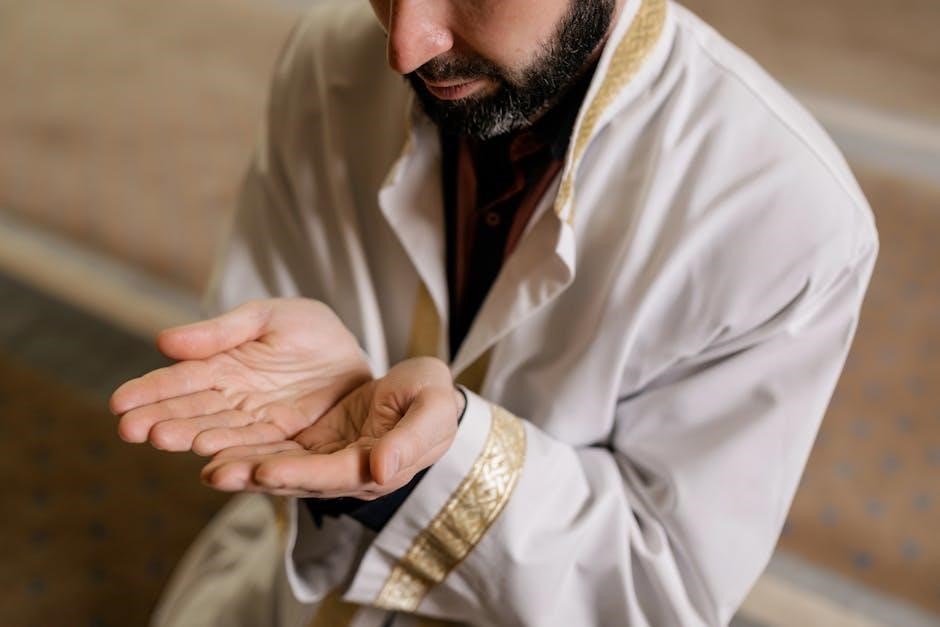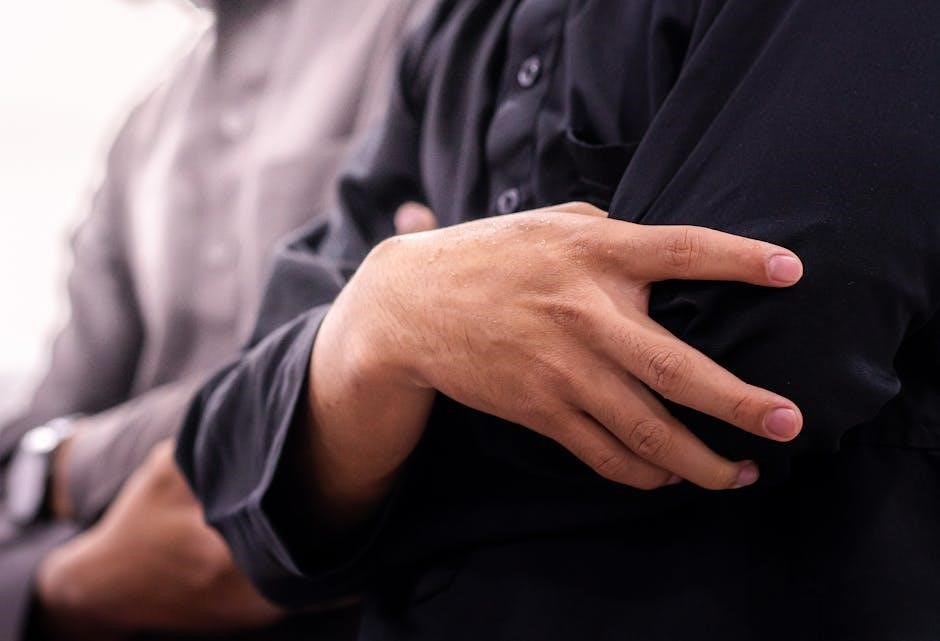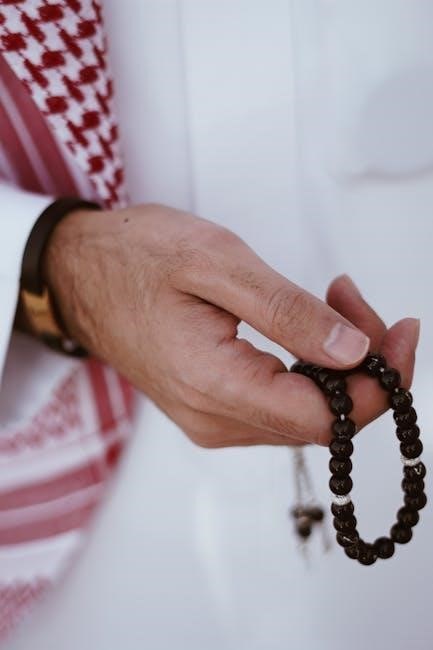Dua after prayer is a sacred act in Islam‚ connecting believers with Allah. The dua after prayer PDF serves as a comprehensive guide‚ offering authentic supplications and their meanings‚ compiled from trusted sources like Fortress of the Muslim. It provides structured supplications for forgiveness‚ protection‚ and healing‚ making it an essential resource for Muslims seeking to deepen their spiritual practice and ensure their duas are performed with proper etiquette and sincerity.
Definition and Importance of Dua in Islam
Dua is a heartfelt supplication to Allah‚ expressing desires‚ gratitude‚ and seeking forgiveness. It is a direct link between a believer and Allah‚ reflecting humility and reliance on Him. In Islam‚ dua is considered a powerful form of worship‚ emphasizing the believer’s dependence on Allah’s mercy and grace. Its importance lies in strengthening one’s spiritual connection‚ seeking guidance‚ and attaining blessings. Dua after prayer is particularly valued‚ as it is a time when supplications are more likely to be accepted‚ fostering a deeper relationship with Allah.
Significance of Dua After Obligatory Prayers
Dua after obligatory prayers holds immense significance‚ as it is a moment when the heart is most receptive to spiritual connection. Specific supplications‚ such as those recited after Fajr and Maghrib prayers‚ are recommended to seek forgiveness‚ protection‚ and blessings. These moments are considered auspicious‚ as the believer has just fulfilled a divine obligation‚ making their supplications more likely to be accepted. The practice strengthens faith‚ fosters gratitude‚ and deepens the bond with Allah‚ emphasizing the importance of sincerity and focus in one’s supplications.

Types of Dua After Prayer
Dua after prayer includes supplications for forgiveness‚ protection‚ and healing. Common types are Astaghfirullah for forgiveness‚ Allahumma Ajirni Min An-Nar for protection‚ and Allahumma Ishfi Kulla Marid for healing.

Dua for Forgiveness (Astaghfirullah)
Astaghfirullah‚ meaning “I seek forgiveness from Allah‚” is a fundamental dua after prayer. It is recommended to recite this supplication repeatedly‚ especially after each obligatory prayer. This practice‚ rooted in the Sunnah‚ emphasizes self-reflection and seeking pardon for sins. The dua is supported by hadiths‚ such as one in Sahih Muslim‚ where the Prophet (peace be upon him) taught this phrase as a means to purify oneself. Regularly invoking Astaghfirullah fosters humility and strengthens one’s spiritual connection with Allah.
Dua for Protection from Hellfire (Allahumma Ajirni Min An-Nar)
The dua “Allahumma Ajirni Min An-Nar” seeks protection from Hellfire‚ emphasizing the believer’s humility and reliance on Allah’s mercy. Recommended to be recited ten times after Fajr and Maghrib prayers‚ this supplication is supported by authentic hadiths‚ such as one in Sahih Muslim. It reflects the Prophet’s teachings on seeking refuge from the Fire‚ fostering a mindset of accountability and gratitude. Regularly invoking this dua strengthens one’s awareness of Allah’s justice and encourages righteous living to avoid divine punishment.
Dua for Health and Healing (Allahumma Ishfi Kulla Marid)
“Allahumma Ishfi Kulla Marid” is a powerful dua for health and healing‚ seeking Allah’s mercy for all those afflicted. Recited after obligatory prayers‚ it emphasizes trust in Allah’s divine will and His ability to restore well-being. This supplication‚ rooted in Islamic tradition‚ encourages believers to turn to Allah for relief from physical and spiritual ailments. Its recitation fosters compassion and reminds Muslims of the importance of seeking Allah’s grace for themselves and others‚ aligning with the Prophet’s teachings on the power of sincere prayer.

Recommended Times for Dua After Prayer
Dua after Fajr and Maghrib prayers is highly recommended‚ as these times are considered auspicious for acceptance. Friday prayers also hold special significance for supplication.
Dua After Fajr and Maghrib Prayers
Dua after Fajr and Maghrib prayers is highly encouraged due to their auspicious timing. Reciting specific supplications like “Allahumma Ajirni Min An-Nar” (O Allah‚ protect me from Hellfire) after Fajr and Maghrib is recommended. These times are considered among the most favorable for dua acceptance. The dua after prayer PDF highlights these moments‚ providing authentic supplications for forgiveness‚ protection‚ and healing. Consistently practicing these duas strengthens one’s connection with Allah and aligns with the Sunnah‚ making them a vital part of daily worship.
Dua After Jumu’ah (Friday Prayer)
Dua after Jumu’ah (Friday Prayer) is highly recommended‚ as Fridays are considered a blessed day in Islam. The dua after prayer PDF includes specific supplications for this occasion‚ such as seeking forgiveness‚ guidance‚ and protection. It emphasizes the importance of reciting authentic duas‚ like “Allahumma Ajirni Min An-Nar” (O Allah‚ protect me from Hellfire)‚ to maximize the spiritual benefits of this sacred time. These supplications‚ sourced from trusted scholars‚ help believers connect deeply with Allah and align their prayers with the Sunnah.

Proper Etiquette for Dua After Prayer
Proper etiquette for dua after prayer includes facing the Qiblah‚ raising the hands (Rafa’ al-Yadayn)‚ and ensuring focus and sincerity. These practices enhance the supplication’s acceptance and alignment with Islamic traditions.
Facing the Qiblah
Facing the Qiblah during dua after prayer is essential‚ as it aligns with Islamic teachings and ensures focus. This practice‚ emphasized in authentic sources‚ helps believers maintain spiritual concentration and connection with Allah. By directing oneself toward the Holy Kaaba‚ worshippers embody unity and obedience‚ reflecting Islam’s universal harmony. Properly facing the Qiblah enhances the sincerity of supplication‚ making it a cornerstone of dua etiquette in resources like the dua after prayer PDF‚ which guide Muslims in their worship.
Raising the Hands (Rafa’ al-Yadayn)
Raising the hands (Rafa’ al-Yadayn) during dua after prayer is a Sunnah practice‚ symbolizing humility and earnestness. Believers lift their palms toward the sky‚ expressing their needs to Allah. This act‚ encouraged in authentic sources‚ enhances the supplicant’s focus and sincerity. The dua after prayer PDF highlights this etiquette‚ providing examples like “Allahumma Ishfi Kulla Marid” (healing supplication). Raising the hands is a powerful way to connect with Allah‚ ensuring supplications are offered with devotion and proper Islamic mannerisms;

Authentic Sources for Dua After Prayer
The dua after prayer PDF relies on the Quran‚ Sahih Hadiths‚ and trusted compilations like Fortress of the Muslim‚ ensuring supplications are rooted in Islamic tradition and authenticity.
Quranic Verses Related to Dua
The Quran emphasizes the significance of dua‚ with verses like “And your Lord said: ‘Call upon Me‚ I will respond to you.’” (40:60). It encourages believers to seek refuge in Allah‚ as in “Seek help through patience and prayer” (2:45). Specific verses guide supplications for forgiveness‚ protection‚ and healing‚ such as “Who forgives sins and accepts repentance” (40:3). The dua after prayer PDF compiles these verses‚ providing a spiritual foundation for post-prayer supplications and inspiring humility and sincerity in worship.
Hadiths on the Virtues of Dua After Salah
The Prophet Muhammad (peace be upon him) emphasized the virtues of dua after salah‚ stating that it is a time when supplications are accepted. The dua after prayer PDF highlights authentic hadiths‚ such as the recommendation to recite Astaghfirullah (I seek Allah’s forgiveness) three times after prayer‚ as narrated in Sahih Muslim (1334). Another hadith in Sahih Bukhari (842) mentions the importance of praising Allah post-salah. These teachings inspire believers to embrace dua as a meaningful spiritual practice‚ fostering a deeper connection with Allah and seeking His mercy and protection.
Benefits of Reciting Dua After Prayer
Reciting dua after prayer strengthens one’s connection with Allah‚ fostering gratitude and seeking divine guidance. It provides emotional and spiritual relief‚ helping believers attain peace and blessings.
Strengthening the Connection with Allah
Dua after prayer is a powerful means of deepening one’s relationship with Allah. By engaging in heartfelt supplication‚ believers express their gratitude‚ seek forgiveness‚ and request guidance. This practice‚ as outlined in the dua after prayer PDF‚ fosters a sense of humility and reliance on Allah‚ enriching spiritual life. Regular recitation of authentic duas strengthens faith‚ bringing believers closer to Allah and enhancing their overall sense of peace and fulfillment.
Seeking Guidance and Blessings
Dua after prayer is a vital means of seeking Allah’s guidance and blessings. Believers humbly request wisdom‚ health‚ and relief from hardships‚ as outlined in the dua after prayer PDF. This practice‚ rooted in the Quran and Sunnah‚ encourages Muslims to ask Allah for beneficial knowledge‚ pure sustenance‚ and acceptance of their deeds. By reciting these supplications‚ individuals demonstrate their reliance on Allah‚ seeking His divine aid in all aspects of life and striving to align their actions with His will. This enhances their spiritual growth and trust in His mercy.
Common Mistakes to Avoid
Common pitfalls include reciting Dua without focus or sincerity and using unauthentic supplications. Ensure all duas are sourced from reliable texts to maintain their validity and effectiveness in worship.
Reciting Dua Without Focus or Sincerity
Reciting Dua without focus or sincerity is a common mistake that diminishes its spiritual impact. Many believers rush through supplications or recite them mindlessly‚ losing the essence of connection with Allah. Sincerity and concentration are vital‚ as Dua is a personal conversation with the Creator. Without genuine intention and focus‚ the Dua becomes merely a routine‚ lacking the heartfelt engagement that Allah desires. It is essential to understand the meaning of the words and to pray with humility and awareness to ensure the Dua is accepted and beneficial.
Using Unauthentic or Innovated Duas
Using unauthentic or innovated Duas is a significant mistake that can lead to rejection of the supplication. Many believers unknowingly recite Duas that are not supported by the Quran or Sunnah‚ classify as bidah. Such practices deviate from the teachings of the Prophet (PBUH) and may result in prayers being unanswered or even disliked by Allah. It is crucial to rely on authentic sources like the Quran‚ Hadith‚ and trusted scholars to ensure Duas are permissible and aligned with Islamic teachings‚ avoiding any innovations that corrupt this beautiful act of worship.
How to Find Authentic Dua After Prayer PDFs
Authentic dua after prayer PDFs can be found on reliable Islamic websites and publications‚ such as those from trusted scholars and verified sources like Fortress of the Muslim. Always check references to ensure the content aligns with Islamic teachings and avoid unverified materials.
Reliable Islamic Websites and Publications
Authentic dua after prayer PDFs are available on trusted platforms like IslamicFinder and Darussalam Publications. These sources provide verified duas from the Quran and Sunnah‚ ensuring accuracy and compliance with Islamic teachings. Publications such as Fortress of the Muslim are widely recognized and recommended for their reliability. Always verify the credibility of the publisher and cross-reference with trusted scholars to ensure the content is authentic and free from innovations.
Checking References from Trusted Scholars
Ensuring the authenticity of dua after prayer PDFs involves verifying references from trusted scholars. Reputable Islamic institutions and scholars‚ such as those from Darussalam Publications‚ provide well-documented sources. Cross-referencing with authentic hadiths‚ like those in Sahih al-Bukhari and Sahih Muslim‚ ensures accuracy. Scholars emphasize avoiding unverified or innovated supplications. By consulting credible authorities‚ believers can confidently practice duas that align with Islamic teachings and avoid.bidah (innovations)‚ preserving the purity of their worship. This step is crucial for maintaining the integrity of one’s spiritual practice.
Dua after prayer strengthens one’s bond with Allah‚ seeking forgiveness‚ protection‚ and blessings. Emphasizing authenticity and sincerity ensures its efficacy‚ guiding believers toward a righteous path.

Summarizing the Importance of Dua After Prayer
Dua after prayer is a powerful means of connecting with Allah‚ expressing gratitude‚ and seeking forgiveness‚ protection‚ and blessings. It encompasses supplications for personal well-being‚ healing‚ and guidance‚ as highlighted in the dua after prayer PDF. This practice‚ rooted in Islamic tradition‚ emphasizes sincerity and authenticity‚ ensuring supplications align with teachings from the Quran and Sunnah. By prioritizing heartfelt and authentic duas‚ believers strengthen their faith and cultivate a deeper relationship with Allah‚ seeking His mercy and grace in all aspects of life.
Encouragement to Practice Consistently
Consistent practice of dua after prayer fosters spiritual growth and strengthens one’s bond with Allah. The dua after prayer PDF offers structured supplications‚ making it easier to maintain regularity. By incorporating these authentic duas into daily routines‚ believers can cultivate mindfulness and gratitude. Regular practice ensures that the heart remains connected to Allah‚ seeking His mercy and blessings in every aspect of life. Embrace consistency to experience the profound impact of dua on both personal and spiritual well-being‚ drawing closer to Allah with each sincere supplication.

